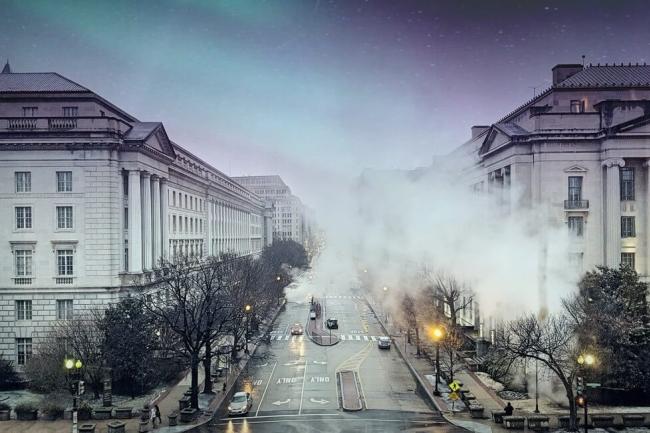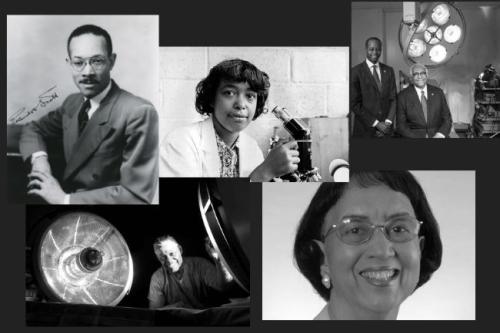WASHINGTON – Howard University Professor of Chemistry and Atmospheric Science, Vernon Morris, Ph.D., has concerns about the poor air quality African Americans have been disproportionately exposed to, making them especially vulnerable to the worst effects of COVID-19. Among other neurological and cardiopulmonary ailments, poor air quality can lead to respiratory problems and make people more vulnerable to the impacts of COVID-19. Additionally, Morris states the coronavirus pandemic will be exacerbated by the effects of natural disasters, such as seasonal tornadoes, hurricanes and wildfires, which may push emergency response systems well beyond their already strained capacities.
“These communities often share the toxic trifecta: chronic exposure to some of the worst air quality in their regions and/or other environmental threats, a disproportionate incidence of negative health preconditions such as diabetes, obesity, heart disease, and respiratory disease, and less access to situationally-responsive health care resources,” says Morris, who is also the director of the NOAA Center for Atmospheric Science and Meteorology.
Morris made the following observations:
- Chronic exposure to poor air quality leads to irreversible developmental effects in humans ranging from increased susceptibility to brain degenerative diseases to decreased lung capacity. All of these conditions make individuals more susceptible to the ravages of COVID-19.
- There is a likelihood of additional strain on hospital systems from simultaneous seasonal natural disasters and the coronavirus pandemic. In particular, natural disasters that can cause changes in regulation and emissions of hazardous air pollutant emissions, chemical leaks and spills that are dangerous for human health on their own, but now may be combined with a global health pandemic.
- There is need for more research to better understand not just how far COVID-19 may travel through the air, but also how long the virus remains viable as an airborne species and on surfaces with the ability to cause disease.
- The current tornado season has required changes to the standard protective responses of this natural hazard to avoid exacerbating the spread of COVID-19. However, if these essential changes are not efficiently communicated to most vulnerable, then their risk levels will continue to increase.
- The looming western wildfire season could lead to mass evacuations and displacement of people from their home. This conflicts directly with the need to shelter in place and physically distance from other people during to the coronavirus pandemic.
“The hurricane and flash flooding seasons in some regions can disrupt critical systems by themselves,” says Morris. “But in a scenario as we find ourselves now, with healthcare systems overtaxed in many areas, the burden on hospitals and their staff may be pushed into an unmanageable disaster.”
Morris is the founding director of the Howard University Atmospheric Science Ph.D. Program. His research largely focuses on humans and ecosystems (geohealth), the chemistry of the air we breathe (air quality), and the physics of the atmosphere (weather and climate). One branch of his research includes studies taken in Washington, D.C., Addis Ababa and Gondar, Ethiopia, Bamako, Mali, Manila, Philippines, and San Juan, Puerto Rico that look at the disproportionate impacts of air pollution on populations of color.
The World Health Organization cites that nearly 10 million premature deaths occur each year due to air pollution.
“That’s more people dying of air pollution than the sum total of deaths due to car accidents, AIDS and smoking annually,” says Morris. “Air chemistry and human health are inextricably intertwined.”
Next, he will research the impact of clean air scenarios, noting that the atmosphere has seen consistent decreases in pollution since March.
How Indoor and Outdoor Air Quality Can be Managed at Home
Morris notes there are ways to improve the air quality at home, but one should be mindful of their actions and previous habits. “Ambient air, also known as outdoor air, quality is not an issue that can be solved by individuals within communities. This is why cars, industries, and commercial products are regulated. This is also why environmental justice and climate justice are absolutely necessary. The greatest tools are awareness, mobilization of political efforts, using the legal and justice systems to ensure that regulatory laws are strengthened and enforced, and (sometimes) direct action.”
Preventative measures for reducing pollution in the outdoor air near you include:
- Do not idle your vehicles.
- Do not burn trash.
- Limit the size of outdoor waste piles.
Preventative measures for indoor air include:
- Use high-quality air filters to regulate the intake of outside air.
- Reduce indoor smoking and wood-burning.
- Use organic or non-toxic cleaning agents within the home.
- Use fragrance-free and natural household products.
- Reduce the number of inflammable (flame retardant) products and furniture, especially if you’re not a smoker. It is best to have a fire extinguisher on hand.
- Reduce the number of hygiene products that contain phthalates, which are indoor air toxins. Recent studies have indicated that personal care products containing phthalates and other semi-volatile organics can add pollution to your indoor air at higher concentrations than found outside.
# # #
(stock image)
About the Atmospheric Science Graduate Program
The Howard University Graduate Program in Atmospheric Science (HUPAS) is an advanced degree-granting interdisciplinary program offering the Master of Science and Doctor of Philosophy degrees in atmospheric science. Established by the Howard University Board of Trustees in 1997, the Program is affiliated with the Departments of Chemistry, Mechanical Engineering and Physics and Astronomy. HUPAS is dedicated to preparing students from traditionally underrepresented groups for leadership careers in atmospheric science and related fields. HUPAS is aiding federal agencies such as NOAA and NASA, as well as industry and academia diversify this niche area of the workforce while engaging in leading research directly relevant to national security, commerce and environmental security. In a relatively short period of existence HUPAS has emerged as an exemplar in realizing Howard’s mission by: delivering experiences of exceptional quality to students; helping to attract a cadre of strong, socially responsible scholars and educators; impacting diversity statistics on the national production of atmospheric scientists, and contributing to critical societal needs through research. HUPAS faculty are recognized experts in mesoscale meteorology, climate modeling, air quality modeling and filed observations, atmospheric physics, atmosphere chemistry and mechanical engineering. To learn more, visit: https://gs.howard.edu/graduate-programs/atmospheric-science
About the National Oceanic and Atmospheric Administration Center for Atmospheric Sciences
In September 2001, the National Oceanic and Atmospheric Administration (NOAA) Center for Atmospheric Sciences (NCAS) was awarded a cooperative agreement with the Department of Commerce NOAA Educational Partnership Program. NCAS is a cooperative partnership between four (4) minority-serving institutions (MSI): Howard University (HU) — the lead institution, Jackson State University (JSU), the University of Puerto Rico at Mayagüez (UPRM), and the University of Texas at El Paso (UTEP); and two (2) majority universities: University of Maryland College Park (UMCP), and the State University of New York at Albany (SUNYA). The four MSI partners possess the highest concentrations of African American and Hispanic students in the physical sciences, engineering, and atmospheric-related disciplines, including meteorology, at the undergraduate and graduate levels. To learn more, visit https://ncas.howard.edu/about-ncas/
Media Contact: Imani Pope-Johns, Imani.popejohns@howard.edu





